hold Politicians' Feet to the Fire - InsiderOnline.org
hold Politicians' Feet to the Fire - InsiderOnline.org
hold Politicians' Feet to the Fire - InsiderOnline.org
You also want an ePaper? Increase the reach of your titles
YUMPU automatically turns print PDFs into web optimized ePapers that Google loves.
Few people s<strong>to</strong>p <strong>to</strong> think about <strong>the</strong><br />
importance of <strong>the</strong> first three words of <strong>the</strong> U.S. Constitution:<br />
“We <strong>the</strong> people.” That simple phrase is <strong>the</strong><br />
heart of a revolution in <strong>the</strong> his<strong>to</strong>ry of governance<br />
and <strong>the</strong> key <strong>to</strong> American exceptionalism. We, <strong>the</strong><br />
people, grant rights <strong>to</strong> <strong>the</strong> government. Rights are<br />
not granted <strong>to</strong> us by a benevolent monarch (whose<br />
heirs could change <strong>the</strong>ir mind). The people of <strong>the</strong><br />
United States grant rights <strong>to</strong> <strong>the</strong> government, not<br />
<strong>the</strong> o<strong>the</strong>r way around—a fact that we emphasize<br />
by fur<strong>the</strong>r limiting <strong>the</strong> powers of <strong>the</strong> government<br />
through <strong>the</strong> first 10 amendments <strong>to</strong> <strong>the</strong> Constitution.<br />
In many ways, this vesting of power with <strong>the</strong><br />
people, ra<strong>the</strong>r than <strong>the</strong> government, also charges<br />
<strong>the</strong> people with <strong>the</strong> responsibility <strong>to</strong> keep <strong>the</strong>ir<br />
own checks on government action and expansion,<br />
demanding correction where necessary.<br />
Founding Principles<br />
Constraining <strong>the</strong> power of <strong>the</strong> government is a<br />
founding principle—perhaps <strong>the</strong> founding principle—<br />
of our country. So determined were <strong>the</strong> Founding<br />
Fa<strong>the</strong>rs <strong>to</strong> express clear limitations on <strong>the</strong> scope of<br />
federal power that <strong>the</strong>ir first changes <strong>to</strong> <strong>the</strong> Constitution<br />
were <strong>to</strong> clarify <strong>the</strong> things that <strong>the</strong> government<br />
was not allowed <strong>to</strong> do.<br />
Contrast this pattern, if you will, <strong>to</strong> <strong>the</strong> way that<br />
legislation proceeds in modern times, with nearly<br />
every focus on adding <strong>to</strong> <strong>the</strong> reach and power of<br />
<strong>the</strong> government, be it federal, state, or local. Judges<br />
squint at <strong>the</strong> Commerce Clause <strong>to</strong> try <strong>to</strong> find even<br />
broader interpretations <strong>to</strong> legitimize Congressional<br />
actions that go far beyond what <strong>the</strong> framers of <strong>the</strong><br />
Constitution must have imagined.<br />
But <strong>the</strong>re is a logic inherent in <strong>the</strong> principle of constraint<br />
and limitation, and nearly every o<strong>the</strong>r founding<br />
principle can be found in its wake. For example:<br />
Individual Liberty. Perhaps <strong>the</strong> one item on which<br />
nearly all Americans can agree, regardless of political<br />
persuasion, is <strong>the</strong> centrality of individual liberty <strong>to</strong> <strong>the</strong><br />
American philosophy of government. While we may<br />
dispute where <strong>the</strong> lines of liberty and responsibility<br />
cross, or where one person’s liberty should take a backseat<br />
<strong>to</strong> o<strong>the</strong>r more fundamental principles, we remain<br />
generally united on <strong>the</strong> principle that <strong>the</strong> government<br />
must not infringe upon certain intrinsic rights.<br />
Respect for Free Enterprise and <strong>the</strong> Free Market.<br />
So much of <strong>the</strong> his<strong>to</strong>ry of America’s Founding<br />
revolves around <strong>the</strong> clear desire <strong>to</strong> conduct one’s<br />
business free from government interference. We are,<br />
in essence, a country partially founded on <strong>the</strong> notion<br />
that taxation is a serious and generally undesirable<br />
matter. Yet, while <strong>the</strong>re is no shortage of defenders of<br />
individual liberty, <strong>to</strong>o few note that <strong>the</strong> free market is<br />
an extension <strong>the</strong>reof. After all, what good is personal<br />
freedom if it ends <strong>the</strong> moment you try <strong>to</strong> put a roof<br />
over your head or food on your table?<br />
Respect for Tradition, Family, and <strong>the</strong> Foundations<br />
of Our Society. Government should not<br />
attempt <strong>to</strong> engage in social engineering or undermine<br />
<strong>the</strong> family. This principle includes respect for both<br />
religious freedom and religious liberty, that difficult<br />
combination of rights that guarantee both our right<br />
<strong>to</strong> practice our religion and our freedom from government<br />
intrusion, denominational favoritism, or even<br />
policies that are hostile <strong>to</strong> religious groups or agencies.<br />
It also includes an understanding of <strong>the</strong> importance<br />
of societal mores, <strong>the</strong> unwritten traditions and<br />
practices that are more deeply ingrained than any law<br />
and operate as both <strong>the</strong> glue that <strong>hold</strong>s us <strong>to</strong>ge<strong>the</strong>r<br />
and <strong>the</strong> oil that allows our society <strong>to</strong> function.<br />
Judicial Restraint. The courts should practice<br />
restraint in <strong>the</strong> same way that <strong>the</strong> legislative and<br />
executive branches should. This restraint includes<br />
staying within <strong>the</strong>ir role as an interpreter of law and<br />
not expanding <strong>the</strong>ir power <strong>to</strong> create legislation from<br />
<strong>the</strong> bench.<br />
Executive Restraint. While <strong>the</strong> judicial branch<br />
has received more attention for its forays in<strong>to</strong> legislative<br />
action, <strong>the</strong> executive branch has been quietly<br />
growing and creating its own body of law based on <strong>the</strong><br />
regula<strong>to</strong>ry power of <strong>the</strong> executive agency. Not only<br />
does this practice muddy <strong>the</strong> waters of accountability,<br />
but it deprives <strong>the</strong> people of <strong>the</strong>ir usual avenues of<br />
26 | The Insider Spring 2012


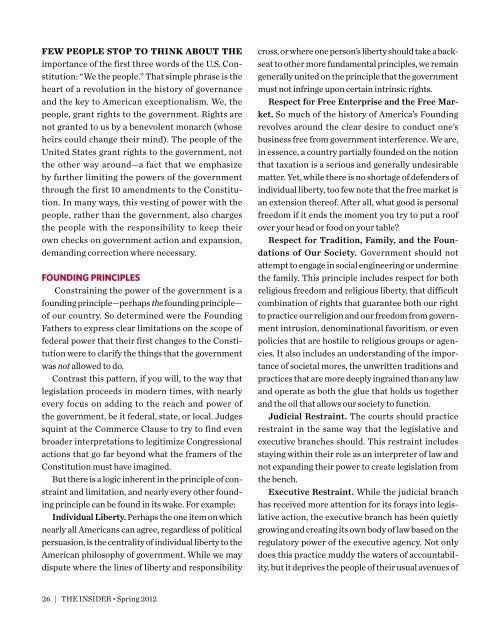
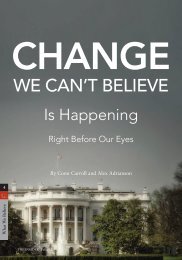
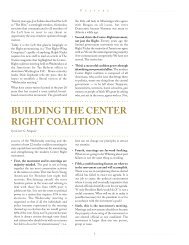
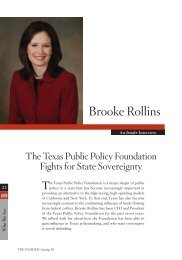
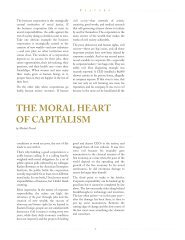
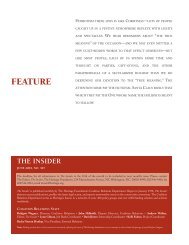
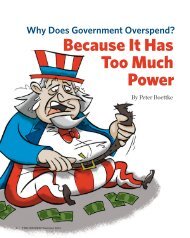
![Roads to Serfdom [PDF] - InsiderOnline.org](https://img.yumpu.com/23433549/1/182x260/roads-to-serfdom-pdf-insideronlineorg.jpg?quality=85)
![Federalism: Statement of Principles [PDF] - InsiderOnline.org](https://img.yumpu.com/21889681/1/182x260/federalism-statement-of-principles-pdf-insideronlineorg.jpg?quality=85)